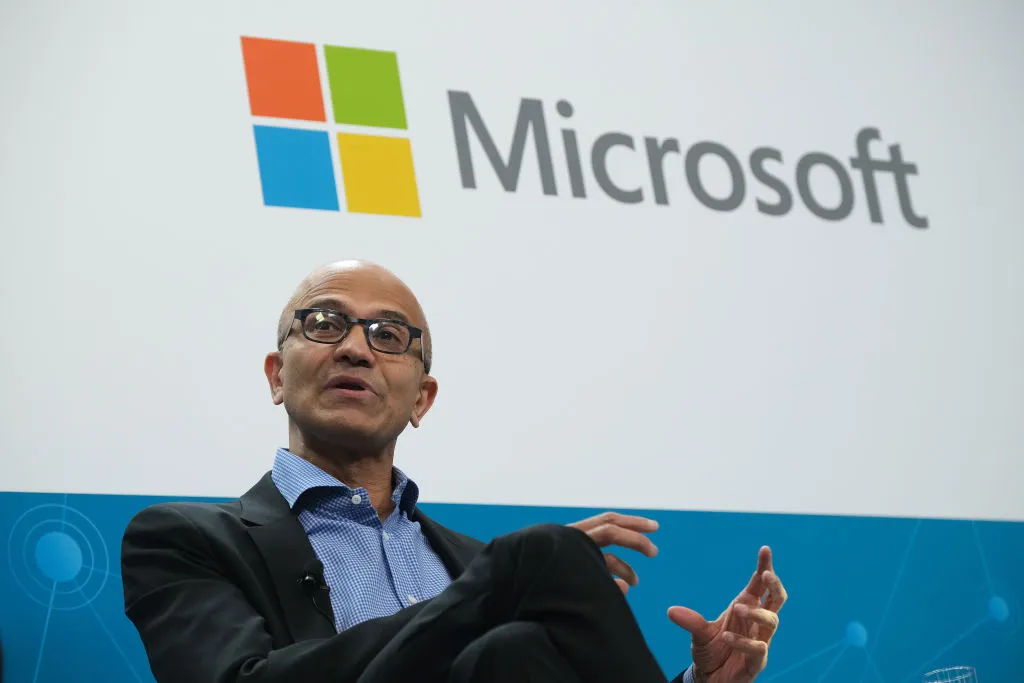Microsoft Launches Copilot-Enabled PCs: Here’s How AI-capable Computers Could Transform the Way We Work

Microsoft launched its new AI-powered PCs, marking a remarkable revolution for the laptops sector. l Credit: Sean Gallup/Getty Images)
Key Takeaways
- Microsoft launched new Surface devices, currently exclusive to business customers.
- The new laptops have the Copilot button, the first addition to the keyboard in 30 years.
- Thanks to this move, Microsoft is leading the artificial intelligence (AI) race.
On Thursday, March 21, 2024, Microsoft unveiled the Surface Pro 10 and Surface Laptop 6 for Business. These new PCs boast a dedicated Copilot button on the keyboard, delivering on a commitment made by the company in January for swift access to the chatbot.
Moreover, while these new laptops are available for business customers only, experts in the tech world wonder if the new release will give Microsoft a leading role in the artificial intelligence (AI) race with competitors.
What’s New?
Microsoft is debuting its inaugural Surface PCs featuring a dedicated Copilot button on the keyboard. The company has fulfilled a pledge made in January. This introduction of the button, situated to the left of the arrow keys, marks one of the most significant changes to keyboards in decades. Despite Microsoft not being the top PC vendor – Lenovo holds that title -, it dominates with its widely used Windows operating system. Lenovo, Dell, and HP have all announced their own PCs featuring Copilot keys.
Historically, the Surface line has showcased the epitome of Windows machines. Microsoft aims to highlight the convenience of having AI at users fingertips with its latest offerings: the convertible Surface Pro 10 for Business and Surface Laptop 6 for Business.
Additionally, remote servers handle the computational tasks required to generate a response when users type a query into Copilot, which uses AI models from Microsoft-backed OpenAI.
Furthermore, in a bid for inclusivity, Microsoft has also launched new accessories tailored for disabled users. Notably, the first detachable keyboard features larger buttons and enhanced backlighting, catering to those with visual impairments. Software updates bring enhancements such as quick links in Windows 11. They facilitate tasks like text reading, font size adjustments, and subtitle activation. These features are now easily toggled with Copilot‘s AI assistance.
Copilot Leads The AI-PCs Revolution
Microsoft dubs these cutting-edge machines AI PCs. Including a new key, granting users instant access to the Copilot panel, could be a game-changer. Each computer is equipped with an Intel Core Ultra processor featuring a specialized neural processing engine (NPU). Surface devices have incorporated NPUs since 2019.
Having NPUs onboard provides several advantages, including quicker responses and enhanced security. The latest AI functionalities in Windows 11, like automatic audio transcription and simulated eye contact during video calls, use the NPU. This, in turn, leaves the rest of the chip to handle other tasks.
Brett Ostrum, head of Microsoft’s Surface division, claimed that 77% of people who tried Copilot “never want to go back”.
He added: “To fully leverage AI, we require computers designed around this technology.”
These notebooks integrate different versions of Copilot developed by Microsoft. They include the recent Copilot for Security, aimed at bolstering data privacy and thwarting computer viruses.
Moreover, Copilot stands as a pioneering AI-powered feature seamlessly woven into the Windows operating system. Drawing upon Microsoft’s language model, trained on extensive text and code datasets, Copilot grasps the context of user input. It also delivers word and phrase suggestions in real-time.
Is Microsoft Winning The AI Race?
As the tech world approaches a new era, pioneering companies like Microsoft are trying to shape the future of AI in computing. By integrating AI into products like the Windows Copilot key and SwiftKey keyboard, they go beyond enhancing user experiences. It envisions AI as a fundamental element in personal computing’s evolution. It also influences device interactions and hardware architecture.
In essence, the rollout of AI-infused features in SwiftKey and the introduction of the Copilot key signify more than routine product updates. They epitomize Microsoft’s overarching attempt to spearhead the AI revolution in technology.
Furthermore, with the increasing demand for AI-integrated systems driving PC market expansion, Microsoft and its semiconductor partners are well-positioned to benefit. Their dedication to AI integration reflects not only adaptive market response but also an attempt to shape technology’s future.
Additionally, this unveiling closely follows Apple‘s introduction of MacBook Air laptops featuring an upgraded Neural Engine accelerator in the custom M3 chip. Apple claimed that “MacBook Air remains the top consumer laptop for AI,” which could signal the start of an ongoing AI-laptop competition.


